Discovery of Moroccan Culinary Heritage, History and Secrets
Set out on a culinary exploration akin to unraveling a tapestry of flavors as you explore the depths of Moroccan gastronomy.
Discover the intricate blend of history, tradition, and secrets that have shaped the culinary identity of this North African gem.
From the vibrant spice markets to the tantalizing tagines, each dish carries a narrative of cultural fusion and culinary ingenuity.
Get ready to uncover the hidden treasures of Moroccan cuisine, as this journey promises to offer a feast for the senses and a newfound appreciation for the culinary heritage that Morocco has to offer.
Key Points
- Moroccan culinary heritage is a fusion of Berber, Arab, Andalusian, Ottoman, French, and Spanish influences.
- Signature dishes like Tagine and Couscous showcase traditional Moroccan flavors and techniques.
- Moroccan spice blends blend cumin, coriander, cinnamon, and paprika, reflecting diverse cultural influences.
- Preservation efforts focus on safeguarding authentic recipes, techniques, and flavors for future generations.
Moroccan Culinary History Overview
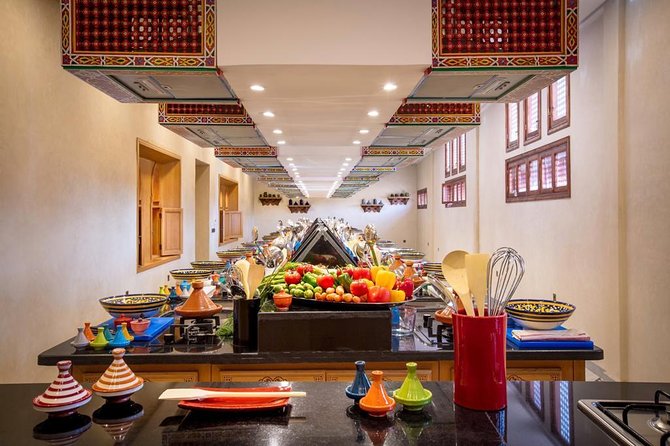
Have you ever wondered about the rich and flavorful history behind Moroccan cuisine?
Moroccan culinary evolution is a fascinating blend of historical influences from various civilizations like the Berbers, Arabs, Andalusians, and Ottomans. Each culture has contributed distinct flavors, spices, and cooking techniques that have shaped the diverse and vibrant Moroccan cuisine we know today.
The Berbers introduced staple ingredients like couscous and tagine, while the Arabs brought in spices such as saffron and cinnamon. The Andalusians influenced dishes with almonds and fruits, adding a sweet and savory element. The Ottomans introduced olives and preserved lemons, enhancing the complexity of flavors in Moroccan dishes.
The amalgamation of these influences has created a culinary heritage that’s both unique and delicious.
Traditional Moroccan Dishes Unveiled
Exploring the vibrant tapestry of Moroccan culinary delights reveals a treasure trove of traditional dishes waiting to be savored and enjoyed.
Moroccan cuisine is a fusion of flavors influenced by Berber, Arab, and French cooking techniques. Tagine, a slow-cooked stew, showcases the art of layering ingredients sourced from local markets like tender meats, dried fruits, and aromatic spices.
Couscous, a staple, is steamed to perfection and served with vegetables or succulent meat. The flavor profiles are rich and varied, often combining sweet and savory notes in dishes like Pastilla, a savory pie with layers of flaky pastry filled with spiced meat or seafood.
For those eager to learn, culinary workshops offer hands-on experiences to master the intricate flavors and techniques of Moroccan cooking.
Influences on Moroccan Cuisine
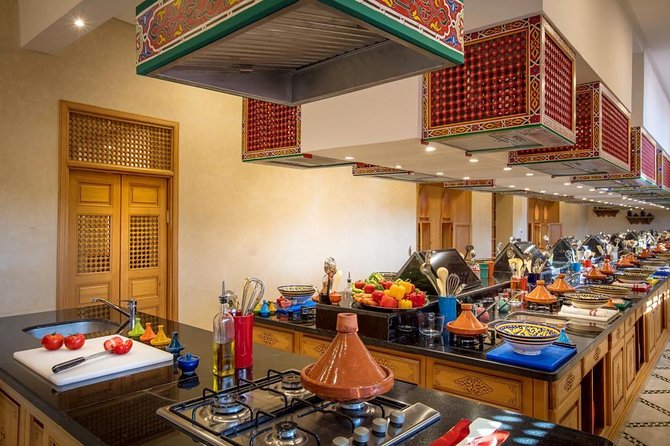
What cultural influences have shaped the diverse and flavorful landscape of Moroccan cuisine?
Moroccan cuisine is a vibrant tapestry woven from a blend of various cultural influences. These influences have left an indelible mark on the culinary traditions of Morocco, enriching its flavors and techniques.
Some key influences include:
-
Mediterranean fusion: The proximity to the Mediterranean Sea has led to a fusion of Moroccan flavors with those of Mediterranean cuisine, incorporating ingredients like olives, olive oil, and fresh herbs.
-
Colonial influences: The colonial history of Morocco, particularly with France and Spain, has introduced new cooking methods, ingredients, and dishes to Moroccan cuisine.
-
Berber heritage: The indigenous Berber people have contributed their traditional cooking techniques and ingredients to Moroccan cuisine.
-
Arab influence: The Arab invasion of Morocco brought spices, dried fruits, and nuts that are now staples in Moroccan dishes.
Secrets of Moroccan Spice Blends
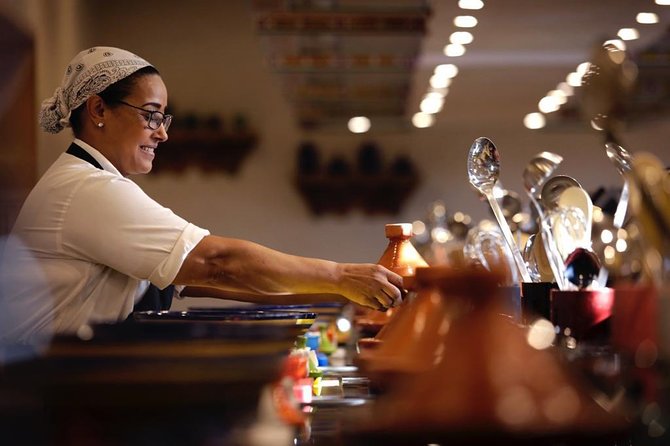
Explore the aromatic world of Moroccan spice blends, where a symphony of flavors awaits to tantalize your taste buds.
Moroccan spice blends are a testament to the country’s rich culinary heritage, with roots tracing back to ancient spice origins along the historic trade routes. The blending techniques used in Moroccan cuisine are a closely guarded secret, passed down through generations, creating a perfect balance of flavors in each dish.
These blends are a result of culinary fusion, combining influences from Berber, Arab, and Mediterranean traditions, resulting in exotic flavors that are both bold and harmonious.
The art of mixing spices like cumin, coriander, cinnamon, and paprika is what gives Moroccan dishes their distinctive taste, making them a delight for foodies worldwide to experience.
Culinary Traditions in Moroccan Culture
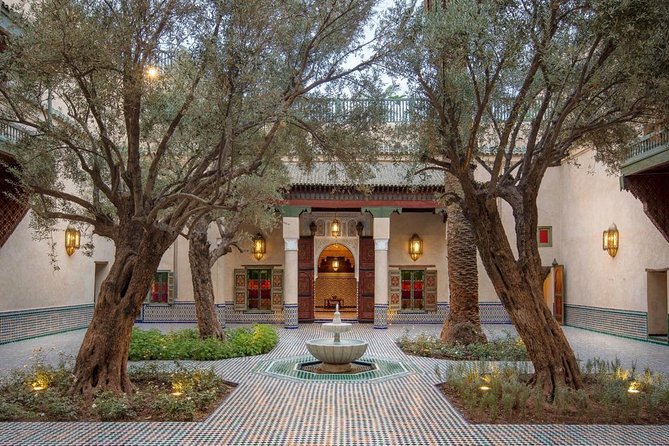
Have Moroccan culinary traditions evolved over time to reflect a diverse cultural tapestry?
Moroccan culinary traditions have indeed evolved over time, blending influences from Berber, Arab, Andalusian, and Mediterranean cultures. This rich tapestry is evident in the variety of cooking techniques and flavors found in Moroccan cuisine. Culinary workshops play a vital role in preserving and passing down these traditions, where both locals and visitors can learn the art of traditional Moroccan cooking firsthand.
-
Tagines: A staple in Moroccan cuisine, these slow-cooked stews are prepared using unique spices and ingredients.
-
Couscous Making: The meticulous process of making couscous by hand showcases the importance of this dish in Moroccan culture.
-
Mint Tea Ritual: The ceremonial preparation and serving of mint tea highlight the significance of hospitality in Moroccan tradition.
-
Spice Blending: Mastering the art of creating spice blends is a fundamental aspect of Moroccan cooking techniques.
Preserving Authentic Moroccan Recipes
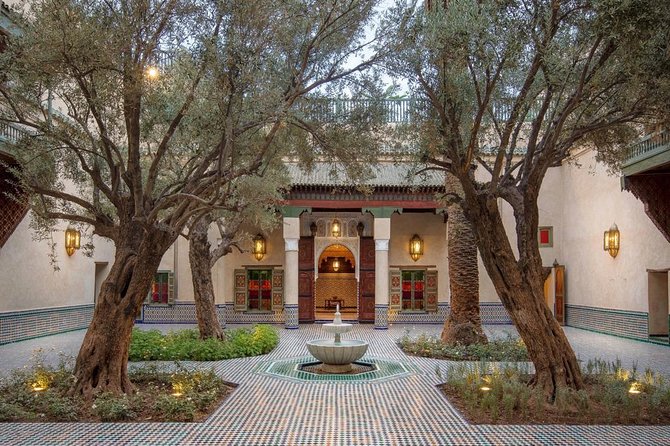
Moroccan culinary heritage thrives through the preservation of authentic recipes that encapsulate centuries-old flavors and techniques from a diverse cultural blend.
Moroccan recipe preservation plays a vital role in safeguarding the rich tapestry of flavors that define the country’s cuisine. By documenting and passing down traditional recipes, this culinary heritage discovery ensures that future generations can savor the authentic tastes of Morocco.
From fragrant tagines to delicate pastries, each dish tells a story of the cultural influences and historical roots that have shaped Moroccan cooking. Through dedicated efforts to maintain these authentic recipes, the essence of Moroccan gastronomy remains alive and continues to delight taste buds around the world.
Common questions
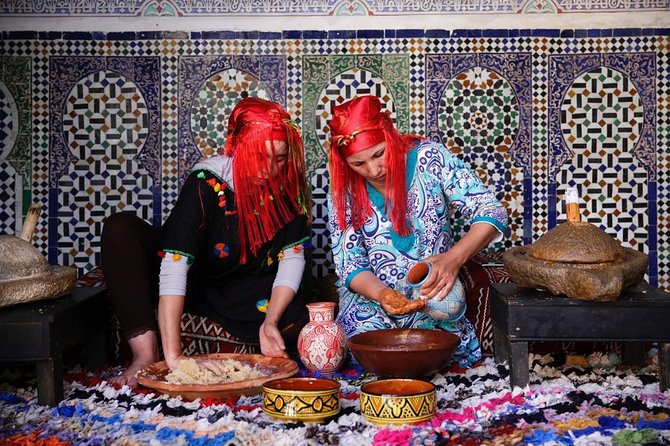
What Are Some Common Cooking Techniques Used in Traditional Moroccan Cuisine?
In traditional Moroccan cuisine, chefs often employ flavorful spices and slow cooking methods to enhance dishes. Unique ingredients and traditional recipes are key elements that contribute to the rich, aromatic flavors found in this culinary tradition.
Are There Any Specific Etiquette or Customs to Keep in Mind When Dining in Morocco?
When dining in Morocco, visitors should embrace the rich dining customs and cultural norms. Respect for elders, using right hand for eating, and accepting tea with both hands are traditional table manners and social etiquette.
How Have Modern Influences Impacted the Evolution of Moroccan Culinary Traditions?
Modern influences, like globalization, have reshaped Moroccan culinary traditions. Fusion dishes blend local flavors with international tastes. Cultural influences inspire culinary innovations, creating a diverse gastronomic landscape that reflects Morocco’s historical tapestry and embraces the world’s palate.
Can You Provide Tips on Where to Find Authentic Moroccan Ingredients Outside of Morocco?
For those seeking authentic Moroccan ingredients outside Morocco, online sources, specialty stores, farmers markets, and ethnic grocers are excellent options. They offer a wide range of spices, preserved lemons, argan oil, and more to elevate your culinary creations.
Are There Any Lesser-Known Regional Dishes or Ingredients That Are Worth Exploring in Moroccan Cuisine?
Travelers exploring local delicacies in Moroccan cuisine should seek out lesser-known regional dishes like B’ssara (fava bean soup) or Maakouda (potato cakes). Uncovering unique flavors of these dishes offers a delightful culinary adventure beyond the usual classics.
Here's more of our most recent tour reviews happening neaby
Last Words
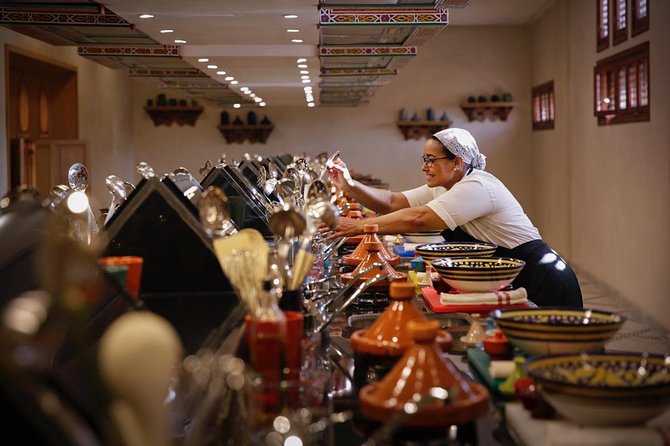
Set out on a culinary journey through Morocco’s rich gastronomic heritage and uncover the secrets and traditions that have shaped its cuisine into a culinary masterpiece.
From the aromatic tagines to the vibrant spices, every dish tells a story of cultural fusion and culinary innovation.
Enjoy the tantalizing flavors and cultural revelations of this North African culinary paradise, and let the taste of Morocco transport you to a world of culinary delight and discovery.